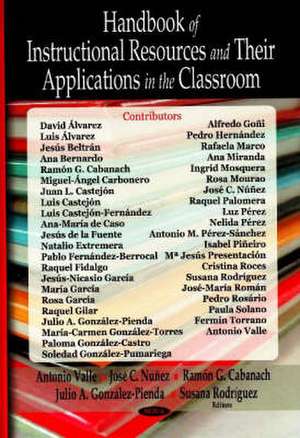Handbook of Instructional Resources and Their Applications in the Classroom
Editat de Mohammad Ahsanullahen Limba Engleză Hardback – 29 feb 2008
Preț: 561.08 lei
Preț vechi: 656.07 lei
-14% Nou
Puncte Express: 842
Preț estimativ în valută:
107.36€ • 112.38$ • 89.36£
107.36€ • 112.38$ • 89.36£
Carte indisponibilă temporar
Doresc să fiu notificat când acest titlu va fi disponibil:
Se trimite...
Preluare comenzi: 021 569.72.76
Specificații
ISBN-13: 9781604561043
ISBN-10: 1604561041
Pagini: 409
Ilustrații: illustrations
Dimensiuni: 184 x 264 x 29 mm
Greutate: 1.04 kg
Editura: Nova Science Publishers Inc
ISBN-10: 1604561041
Pagini: 409
Ilustrații: illustrations
Dimensiuni: 184 x 264 x 29 mm
Greutate: 1.04 kg
Editura: Nova Science Publishers Inc
Cuprins
Preface; From "G Factor" to Multiple Intelligencies: Theoretical Foundations and Implications for Classroom Practice; Beyond the Intelligence: Predictive Power of the Theory of the Mental Molds (MMT) on the Effectiveness and the Achievement; Intellectual Abilities, Thinking Styles, and Academic Achievement; Emotional Intelligence as a Crucial Mental Ability on Educational Context; Learning Strategies; Storytelling as a Promoter of Self-Regulated Learning (SRL) Throughout Schooling; Homework and Self-Regulated Learning (SRL) at Issue: Findings and Future Trends; Explicit and Implicit Cognitive Learning Strategies; Learning from Texts by Means of Strategies; Fostering the Self-Regulation of the Recursive Thinking involved in Composition Writing; Pedagogic Experiences with the CSIT Model. Strategic Learning and the Use of the New Technologies; Methods and Instruments for Measuring Self-Regulated Learning; Changes in Cognitive-Motivational Changes Factors Resulting from the Process of Scholastic Transition; An Intervention Programme for the Improvement of Students' Academic Goals; An Intervention Programme for the Improvement of Self-Perceptions and Self-Beliefs; You Can Write, Just Do It: Enhancing Self-Efficacy; Socio-Personal Development and Psychoeducational Intervention; Action-Emotion Style as a Characteristic of Achievement Motivation in University Students; Stress in University Students. The Subjective Experience of Stress and Coping; Intervention in Exceptional Students through Multiple Intelligencies; Advances in the Knowledge about Students with Attention Deficit with Hyperactivity (ADHD); Intervention to Improve Attentional Processes; Attitudes at School Toward the Disabled Student: The Case of the Student Who Stutters; Index.
